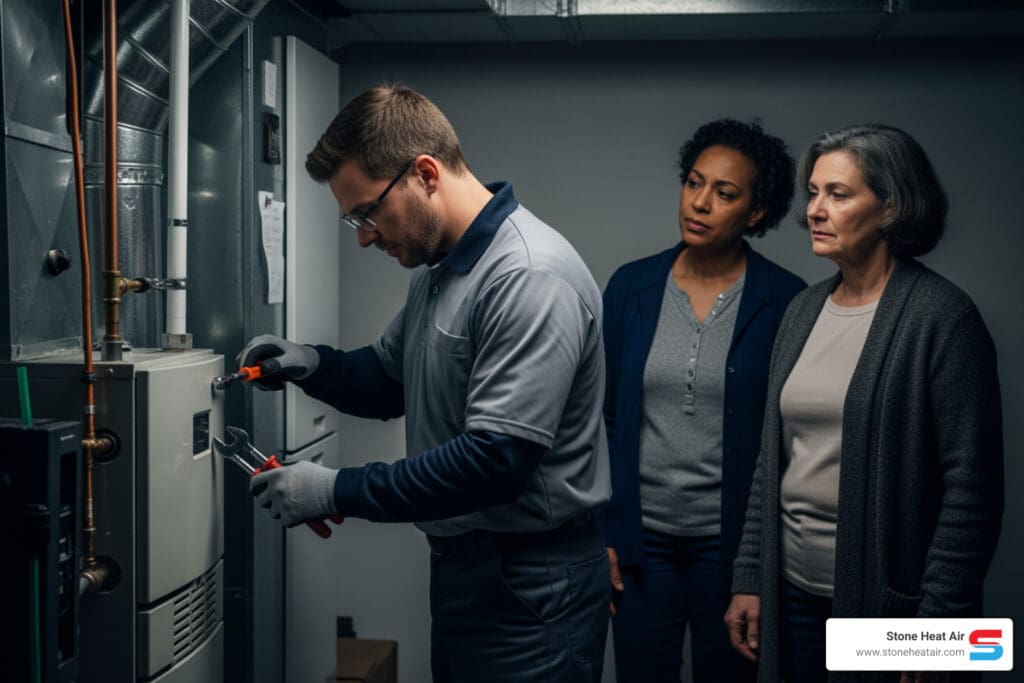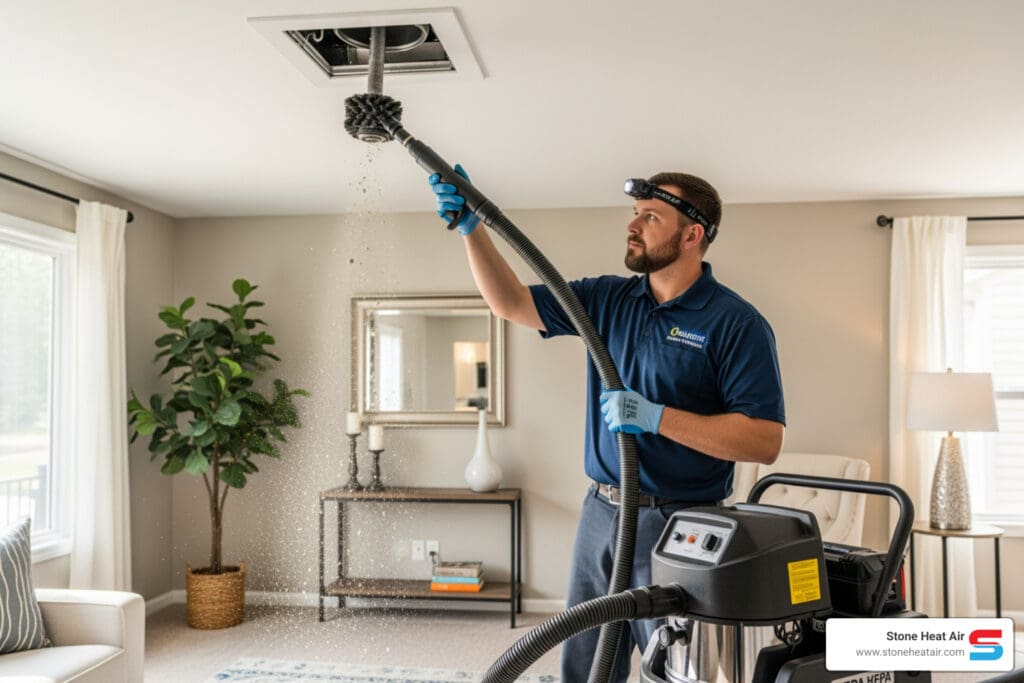Chilly Air from Your Heat Pump? A Grants Pass Homeowner’s Guide to Warmth
Why Your Heat Pump Might Be Blowing Cold Air
If you’ve noticed your heat pump blowing cold air in Grants Pass, OR, you’re not alone—and you’re probably wondering what’s wrong. The good news is that many causes are simple and fixable, while others require a professional eye.
Quick diagnostic checklist for cold air from your heat pump:
- Check your thermostat – Make sure it’s set to HEAT mode (not COOL or AUTO) and the fan is on AUTO (not ON).
- Inspect your air filter – A clogged filter restricts airflow and can make air feel cooler.
- Look at your outdoor unit – Clear away any snow, ice, leaves, or debris blocking airflow.
- Test the 20-degree rule – Measure air at a supply vent and a return vent; supply air should be 15-30°F warmer.
- Watch for defrost cycles – Your heat pump may blow cool air for 5-15 minutes while melting ice off the outdoor coil (this is normal).
- Check for unusual signs – Hissing sounds, frozen coils, or constantly running equipment signals a professional repair need.
If you’re dealing with more complex heating issues, learn more about how heat pumps work during summer and winter. For immediate help with a malfunctioning system, contact our heating repair team.
Heat pumps work differently than furnaces. They extract warmth from outdoor air—even when it’s cold—and move it inside your home. During Grants Pass winters, where temperatures typically range from 36°F to 47°F, your heat pump should handle most heating needs without trouble. But when something goes wrong, it’s important to know whether you’re dealing with normal operation, a quick fix, or a repair that needs professional attention.
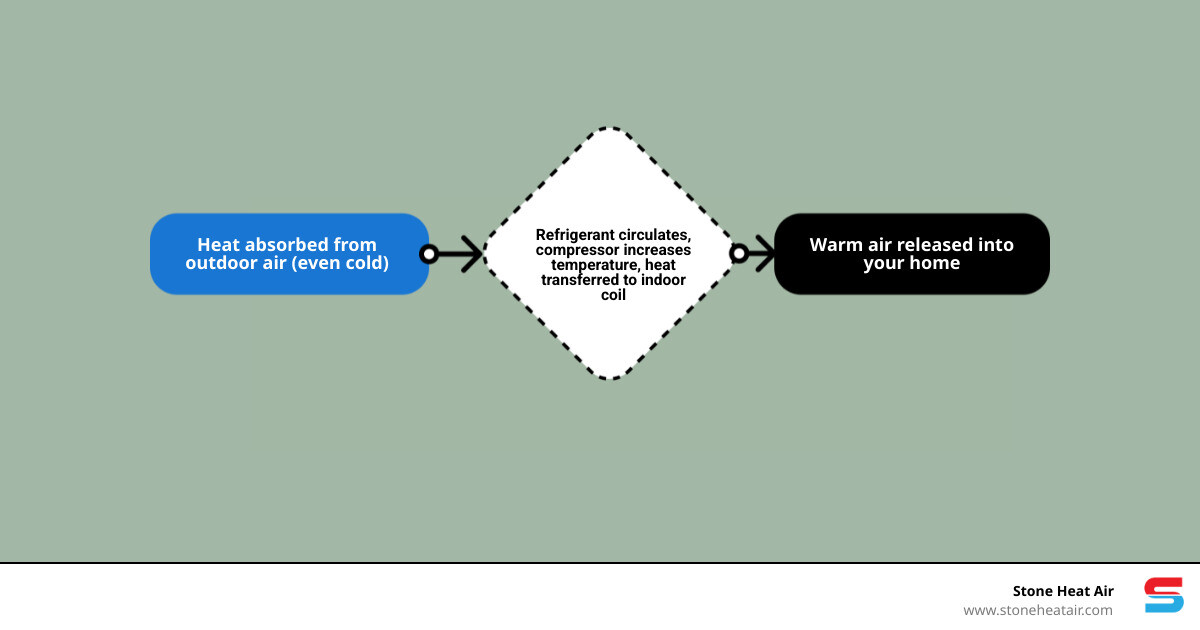
Is It Really a Problem? Understanding Normal Heat Pump Operation
Before you start worrying about your heat pump blowing cold air in Grants Pass, OR, let’s talk about something that catches many homeowners off guard: heat pumps don’t feel like furnaces. And that’s completely normal.
If you grew up with a traditional gas or oil furnace, you’re probably used to those powerful blasts of hot air that practically knock you over when you walk past a vent. Heat pumps? They’re a different breed entirely. The air they produce often feels surprisingly mild—sometimes even what you might describe as lukewarm—and that causes a lot of unnecessary panic.
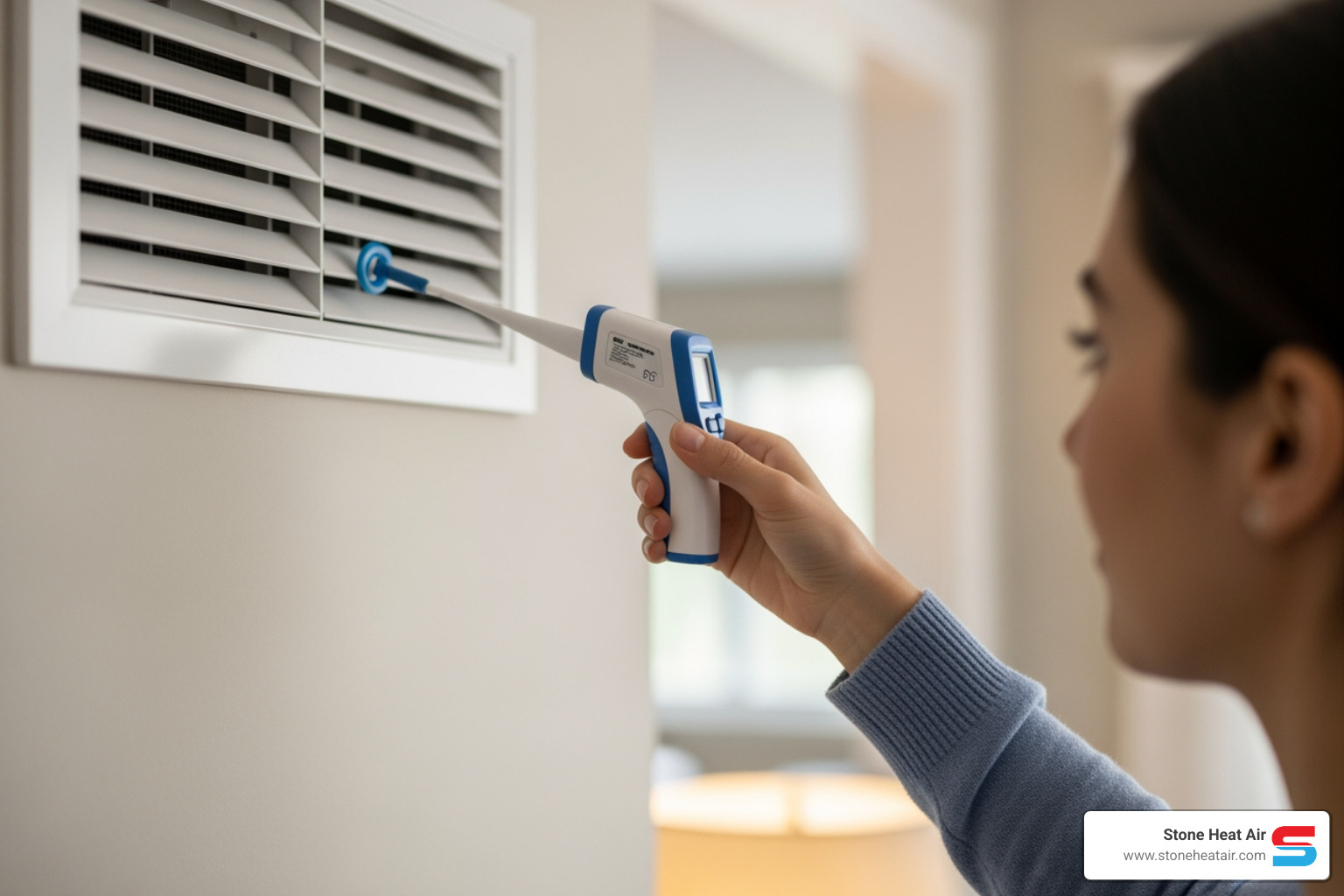
The good news? What feels “wrong” is often just your system working exactly as designed. Understanding the difference between a false alarm and a real problem can save you worry (and an unnecessary service call). For more on this topic, check out false alarms vs. actual issues: identifying heat pump problems.
Why Heat Pump Air Feels Different
Here’s the science behind that lukewarm sensation: furnaces blast air at 110-140°F, while heat pumps typically deliver air around 85-90°F. That’s a huge difference you can definitely feel.
Why such a gap? Furnaces create heat by burning fuel—gas, oil, or propane—which generates extremely high temperatures. Heat pumps, on the other hand, don’t create heat. They move it. Even on a chilly Grants Pass morning, there’s still heat energy in the outdoor air. Your heat pump captures that energy and transfers it inside, warming your home gradually and efficiently.
Here’s the kicker: your body temperature is 98.6°F. So when 85-90°F air brushes against your skin, it actually feels cool by comparison, even though it’s plenty warm enough to heat your home. If you stand directly under a vent, you might even feel a slight chill—but your thermostat will tell a different story. If your home is staying comfortable and reaching the temperature you’ve set, your heat pump is doing its job beautifully.
This consistent, gentle heating is actually one of heat pump’s biggest advantages. Instead of cycling on and off with dramatic temperature swings, they maintain steady, even warmth throughout your home.
The 20-Degree Rule: A Quick Diagnostic
Want to know for sure if your heat pump is working properly? Try this simple test that HVAC professionals use all the time.
Grab a digital thermometer and head to your vents. First, hold it up to a supply vent—that’s where the conditioned air comes out into your room. Note the temperature. Then find a return vent—where air gets pulled back into your system—and measure there too. Now subtract the return temperature from the supply temperature.
A properly functioning heat pump should show a 15-30 degree difference. If your supply air is 20 degrees warmer than your return air, you’re right in the sweet spot. Your system is successfully adding heat to your home, even if it doesn’t feel like a roaring fire.
But if the difference is less than 15 degrees—or worse, if there’s barely any difference at all—then you’ve confirmed that something really is wrong. Your heat pump isn’t just feeling cold; it’s actually failing to heat properly. That’s when it’s time to dig deeper into what might be causing the problem.
This quick diagnostic can save you a lot of guesswork and help you communicate more clearly with a technician if you do need to call for service.
Common Causes for a Heat Pump Blowing Cold Air in Grants Pass, OR
Once you’ve confirmed that the chilly air isn’t just a trick of perception, it’s time to investigate the more common culprits behind a malfunctioning heat pump. The encouraging news? Many of these issues are surprisingly straightforward to identify and, in some cases, you might even be able to fix them yourself before calling in the pros.
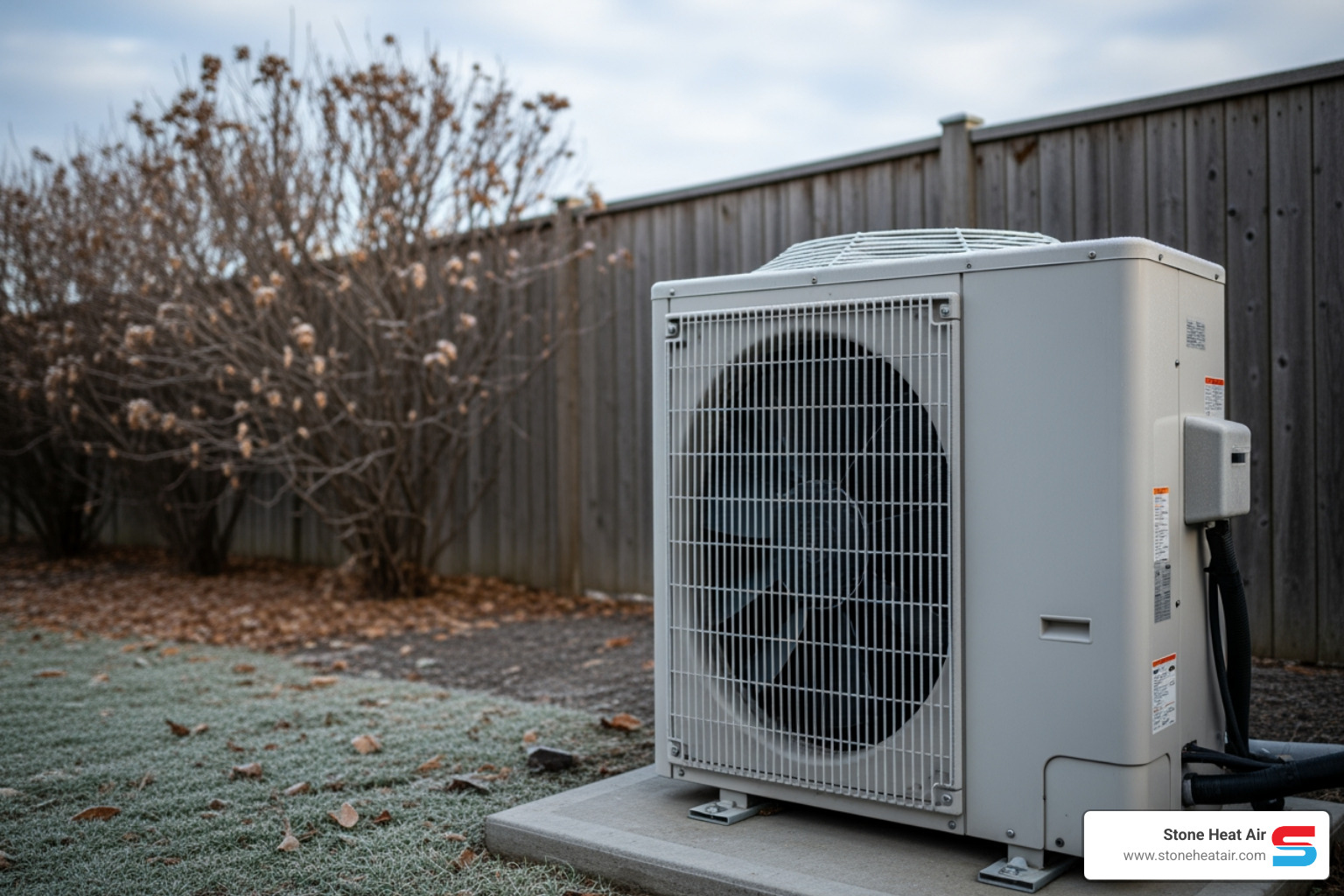
Your System is Just Taking a Breather: The Defrost Cycle
If you’ve ever glanced out your window and noticed your heat pump’s outdoor unit looking like it’s working in reverse, you might have caught it in the middle of a defrost cycle. This is one of the most common reasons homeowners worry about their heat pump blowing cold air in Grants Pass, OR, but here’s the thing: it’s completely normal.
During those damp, chilly Grants Pass mornings when temperatures hover in the 30s and 40s, moisture from the air can freeze on your outdoor coil. Think of it like frost forming on your car windshield, except this ice buildup makes it harder for your heat pump to pull heat from the outside air. Your system is smart enough to recognize this problem and automatically switches into defrost mode to melt the ice away.
Here’s where things get interesting. To defrost that outdoor coil, your heat pump temporarily reverses its operation, sending warm refrigerant outside. During this brief period, which typically lasts 5 to 15 minutes, your auxiliary heat strips usually kick in to keep your home warm. But sometimes there’s a slight delay, or the system cycles between modes, and you might feel cooler air coming from your vents.
If the cool air only lasts a few minutes and then warmth returns, your heat pump was simply taking care of itself. However, if these defrost cycles happen constantly—say, more than once every 30 minutes—or if they last significantly longer than 15 minutes, something’s not quite right and it’s time to call for help. For more insights into this common concern, take a look at our guide on why your heater is blowing cold air.
Easy Fixes You Can Do in 5 Minutes
Before you reach for the phone, let’s walk through a couple of quick checks that solve the problem more often than you’d think. We’ve lost count of how many service calls turned out to be simple thermostat mix-ups or dirty filters!
Check your thermostat settings first. We know this sounds almost too simple, but you’d be surprised how often this is the culprit. Make absolutely sure your thermostat is set to HEAT mode, not COOL or AUTO. While you’re there, verify that the fan setting is on AUTO rather than ON. When the fan is set to ON, it runs continuously, pushing air through your vents even when the heat pump isn’t actively heating. That constant airflow can feel surprisingly cool, especially if it’s just circulating room-temperature air.
Now, when did you last change your air filter? A clogged filter is like asking your heat pump to breathe through a pillow—it just can’t move enough air to heat your home effectively. Even when your system is producing warm air, a dirty filter restricts airflow so much that the air coming from your vents feels cooler than it should. We recommend checking your filter every month and replacing it every 1 to 3 months, depending on whether you have pets, allergies, or how much dust your home collects. This simple maintenance task makes a world of difference for both comfort and efficiency. If you’re experiencing other heating issues, our article on why your heater won’t turn on covers additional troubleshooting steps.
Checking the Outdoor Unit and Power Supply
Your outdoor unit works hard year-round, but it needs a little help from you to do its job properly. Let’s take a quick walk outside to see if anything’s blocking its way.
Give your outdoor unit a visual inspection. Walk around it and look for anything that might be obstructing airflow. Fallen leaves, pine needles, grass clippings, and debris have a way of accumulating around the unit, especially during Grants Pass’s wet winter months. If we’ve had a particularly cold snap, you might also see snow or ice buildup beyond the normal frost that occurs during defrost cycles. Your heat pump needs at least two feet of clearance on all sides to pull in air efficiently. Gently clear away any debris with your hands or a soft brush. If there’s ice, resist the urge to chip it away with sharp tools—you could easily damage the delicate coils.
Don’t forget to check your circuit breaker panel. Sometimes the problem isn’t with the heat pump itself but with its power supply. Head to your electrical panel and scan for any tripped breakers. Your heat pump typically has dedicated breakers for both the outdoor unit and the indoor air handler or auxiliary heat strips. A tripped breaker is easy to spot—it’ll be in a middle position or switched to OFF. Flip it firmly to the OFF position first, then back to ON. If it immediately trips again, stop there. Don’t keep resetting it. A breaker that repeatedly trips is telling you there’s an electrical issue that needs professional attention right away.
When to Suspect a Deeper Problem That Needs a Pro
You’ve checked your thermostat, swapped out the air filter, cleared debris from around your outdoor unit, and verified that your circuit breakers are all set. But your heat pump blowing cold air in GrantsPass, OR isn’t getting any better. At this point, it’s likely time to call in the cavalry.
Some heat pump problems go beyond simple fixes. They involve complex mechanical components, refrigerant systems, and electrical work that require specialized knowledge and tools. Trying to tackle these issues yourself isn’t just frustrating—it can be genuinely dangerous and might even make the problem worse. Here’s what you’re likely dealing with when the simple solutions don’t cut it.
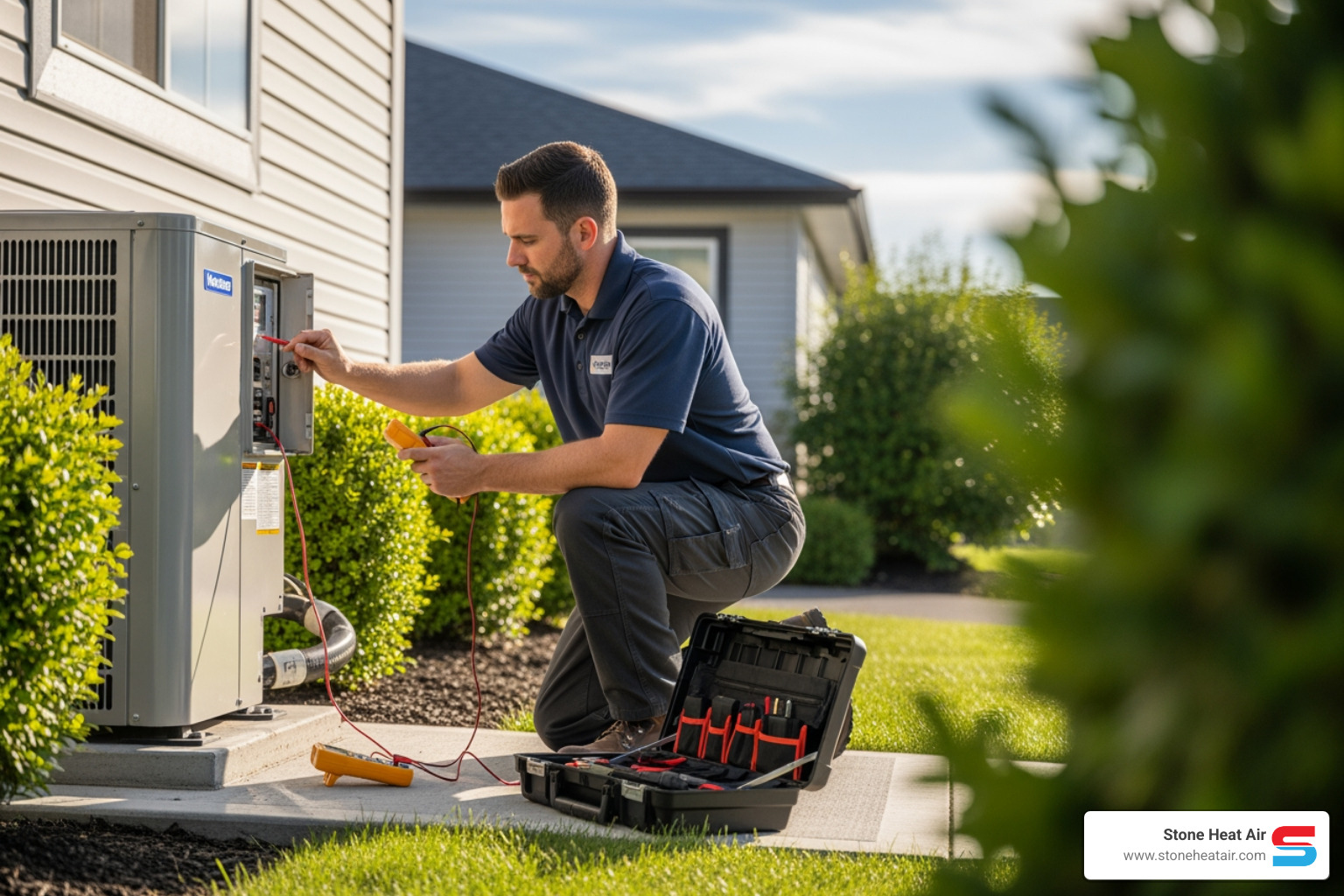
Why is my heat pump blowing cold air in Grants Pass, OR due to a refrigerant leak?
Think of refrigerant as the blood flowing through your heat pump’s veins. It’s the substance that actually absorbs heat from the outdoor air and carries it inside your home. When you have a refrigerant leak, your heat pump loses its ability to move heat effectively, and you’re left shivering under cold air from your vents.
Refrigerant leaks don’t fix themselves, and they’re not something you can patch up with duct tape and good intentions. You might notice hissing or gurgling sounds coming from your system—that’s the sound of refrigerant escaping under pressure. Sometimes you’ll spot oily residue around your outdoor unit or along the refrigerant lines, since the refrigerant carries lubricating oil with it as it leaks out.
Here’s something that trips people up: you might actually see frozen evaporator coils on your indoor unit. It seems backward, right? A leak should make things warmer, not colder. But when refrigerant levels drop, the remaining refrigerant gets too cold as it expands, causing moisture in the air to freeze solid on the coils. Meanwhile, your system runs constantly, working overtime to reach your desired temperature and never quite getting there. Your energy bills climb, and your comfort plummets.
Refrigerant isn’t just ineffective when it’s low—it’s also a hazardous substance that requires EPA certification to handle legally. A certified technician can accurately detect where the leak is occurring, repair it properly, and recharge your system with the correct amount of refrigerant. If you suspect you’re dealing with a leak, don’t wait. Get professional help right away. For more details on this issue, check out heat pump leaks: why they happen & what to do about them.
Mechanical Failures: A Stuck Reversing Valve
Your heat pump has a component called a reversing valve that acts like a traffic controller for your refrigerant. It’s the piece of equipment that allows your heat pump to switch between heating your home in winter and cooling it in summer. When you change your thermostat from COOL to HEAT, the reversing valve redirects the flow of refrigerant so it absorbs heat from outside and releases it inside.
But what happens when this valve gets stuck? If it’s stuck in cooling mode, your heat pump essentially thinks it’s summertime, no matter what your thermostat says. Even with your system set to HEAT, it’ll keep trying to cool your home, sending a steady stream of cold air through your vents. Not exactly ideal when it’s 38°F outside and you’re huddled under blankets inside.
You might hear clicking noises coming from your outdoor unit as the system tries unsuccessfully to switch modes. Or you might notice that your heat pump runs and runs without ever producing warm air. The reversing valve involves both electrical components and refrigerant system connections, making it a complex repair that’s definitely in professional territory.
Diagnosing a faulty reversing valve requires specialized tools and expertise. A technician needs to test the valve’s operation, check electrical connections, and potentially work with the refrigerant system—all tasks that require training and certification. If your heat pump stubbornly refuses to heat no matter what you do, the reversing valve is a prime suspect. You can learn more about this frustrating situation in our article: SOS: My Heat Pump Won’t Switch to Heating Mode.
When you’re facing these deeper issues, don’t feel bad about calling for help. These are exactly the kinds of problems that HVAC professionals train for years to handle safely and effectively. At Stone Heat Air, we’re available 24/7 for emergency service when your heat pump decides to act up at the worst possible moment.
Preventing Future Chills: Maintenance and Climate Considerations
The best way to avoid waking up to a heat pump blowing cold air in Grants Pass, OR is simple: take care of it before problems arise. Think of it like this—you wouldn’t skip oil changes and then be surprised when your car breaks down, right? Your heat pump deserves the same attention. A little proactive care goes a long way toward keeping your home consistently comfortable and your system running efficiently for years to come.
Proactive maintenance to prevent your heat pump from blowing cold air in Grants Pass, OR
There are several maintenance tasks you can handle yourself that make a real difference. Changing your air filter every 1 to 3 months is probably the single most important thing you can do. A clean filter means proper airflow, and proper airflow means efficient heating. If you have pets or allergies, you might need to change it even more frequently.
Keep your outdoor unit clear of debris—leaves, grass clippings, twigs, and dirt can all accumulate around the unit and block airflow. We recommend checking it regularly and making sure there’s at least two feet of clearance on all sides. In winter, gently remove any excessive snow or ice buildup, but be careful not to damage the delicate fins with sharp tools.
Visually inspect your system from time to time. Look for any obvious signs of wear, loose wires, or physical damage. And listen for unusual noises—grinding, hissing, clunking, or squealing sounds are often your heat pump’s way of telling you something’s wrong before it becomes a bigger problem.
But here’s the thing: DIY maintenance only goes so far. Annual professional tune-ups are absolutely essential. During these visits, our certified technicians perform a comprehensive inspection that goes far beyond what you can do yourself. We’ll clean your coils, check refrigerant levels and pressures, test all electrical components and connections, lubricate moving parts, verify your thermostat is calibrated correctly, inspect ductwork for leaks, and test critical functions like the defrost cycle and reversing valve.
These thorough checkups catch minor issues before they turn into major breakdowns—the kind that leave you shivering at 2 a.m. on the coldest night of the year. Our Stone Comfort Membership Club offers members peace of mind with annual tune-ups and exclusive discounts. To understand just how much these regular visits matter, explore the importance of regular HVAC maintenance.
Is Your Heat Pump Right for the Grants Pass Climate?
Grants Pass enjoys relatively mild winters, with average temperatures typically ranging from 36°F to 47°F. That’s actually ideal territory for most heat pumps. But we do get those occasional cold snaps, and understanding how your heat pump performs when the mercury drops is crucial.
Here’s what happens: as outdoor temperatures fall, there’s less heat energy available in the air for your heat pump to extract. Standard heat pumps can start to struggle when temperatures dip below 30-40°F. They’re still working, but they’re working harder and less efficiently. This is when your auxiliary heat strips automatically kick in to help maintain comfort. These supplemental heating elements ensure your home stays warm, but they’re typically less energy-efficient than the heat pump’s normal operation.
If you notice your home struggling to stay comfortable during colder nights, or if your energy bills spike because your auxiliary heat is running constantly, it might be worth considering a cold-climate heat pump. These advanced systems are specifically engineered to extract heat effectively from very cold air—some can operate efficiently even down to -13°F. They’re designed for exactly the kind of occasional cold weather we experience here in Southern Oregon.
System sizing is another critical factor that often gets overlooked. An undersized heat pump will constantly struggle to keep up with demand, especially during those colder stretches. An oversized unit, on the other hand, will short-cycle—turning on and off too frequently—which wastes energy and wears out components faster. A professional load calculation ensures your system is perfectly matched to your home’s specific heating needs. You can learn more about what to expect from your system when temperatures drop in our article on heat pump performance in cold temperatures: what to expect.
Conclusion: Restoring Warmth to Your Grants Pass Home
When you’re dealing with a heat pump blowing cold air in Grants Pass, OR, it’s natural to feel a mix of frustration and concern. After all, you’re just trying to keep your family comfortable during those chilly Southern Oregon evenings. But here’s the good news: you now have the knowledge to understand what’s really happening with your system.
Sometimes, that “cold” air is simply how heat pumps work—delivering warmth at a lower temperature than you might expect from a furnace. Other times, your system is just taking a quick defrost break to keep itself running efficiently. And yes, occasionally it’s something as simple as a thermostat setting or a clogged filter that needs your attention.
The key takeaway? Start with the simple checks first. Verify your thermostat is set correctly, swap out that air filter, clear debris from your outdoor unit, and use the 20-degree rule to see if your system is actually heating properly. These quick steps can often solve the problem without any professional help needed.
But when you’re facing more complex issues—like a refrigerant leak, a stuck reversing valve, or persistent problems that don’t respond to basic troubleshooting—that’s when it’s time to call in the experts. Attempting DIY repairs on these components can be dangerous and might cause more harm than good.
The best way to avoid future cold air surprises is through proactive maintenance. Regular filter changes, keeping your outdoor unit clear, and scheduling annual professional tune-ups can catch small issues before they become big, uncomfortable problems. Think of it as an investment in your comfort and your system’s longevity.
At Stone Heat Air, we understand how important your home comfort is, especially during those cold Grants Pass winters. Our team is dedicated to providing honest, reliable service that keeps your heat pump running smoothly year-round. Whether you need a routine maintenance visit or you’re facing an emergency breakdown in the middle of a cold night, we’re here for you with 24/7 emergency service. Our Stone Comfort Membership Club members enjoy additional peace of mind with priority service and exclusive benefits.
Don’t let a malfunctioning heat pump leave you in the cold. For expert heat pump service and repair in Grants Pass, contact our team today! We’ll get your system back to keeping you warm and comfortable, just as it should be.
Category: Heating
Request An Appointment
Related Content
